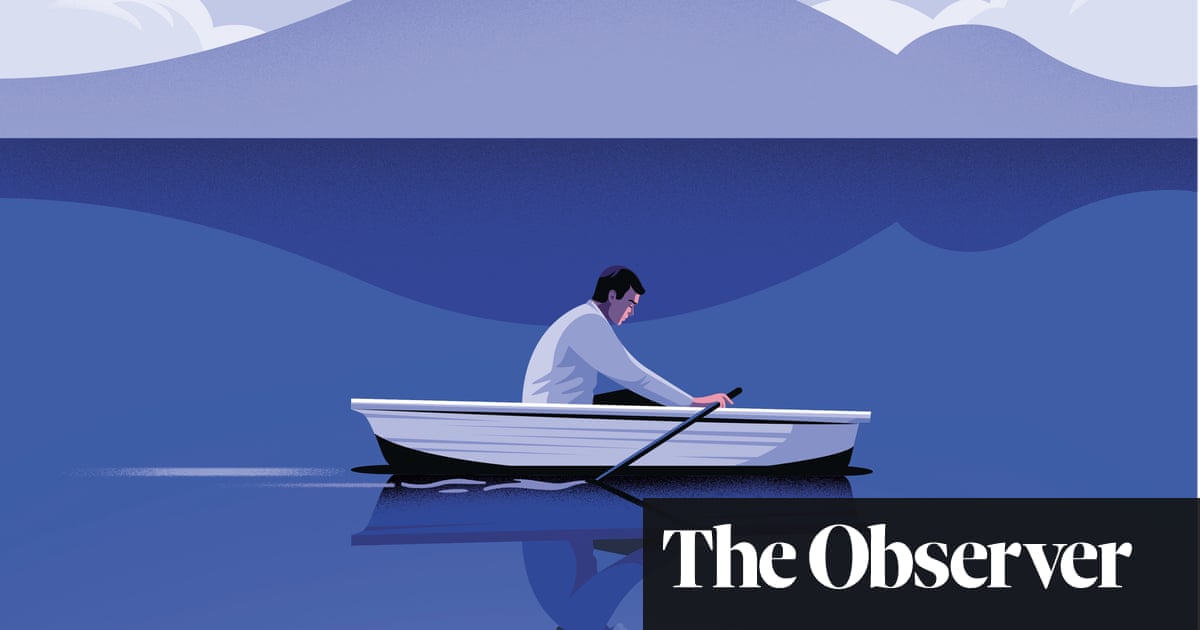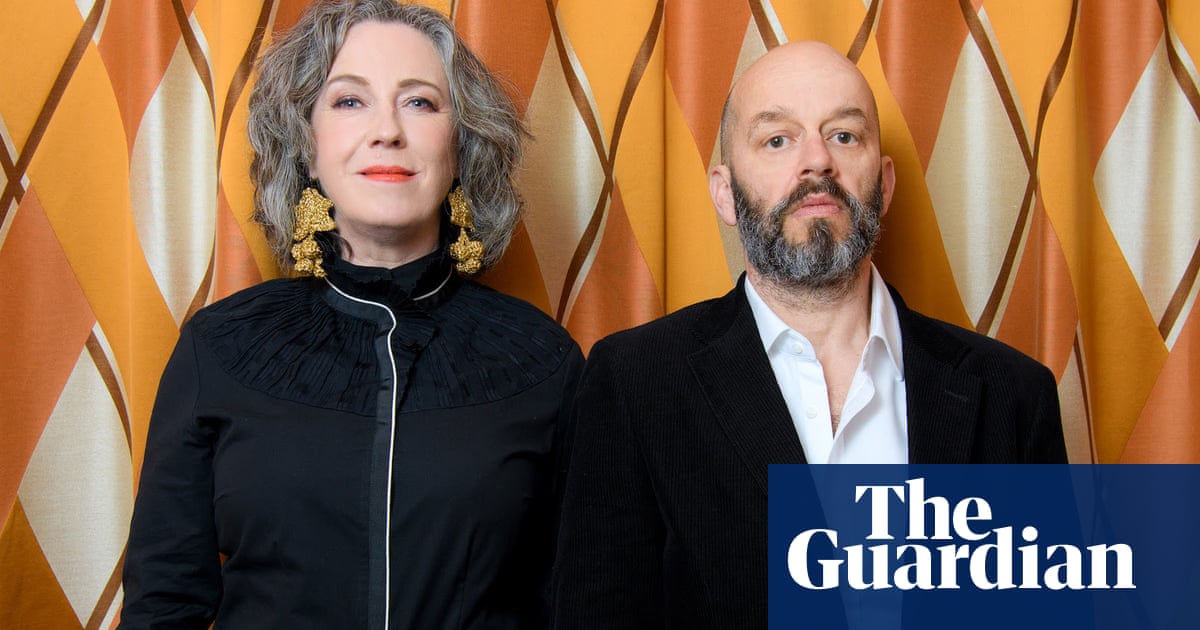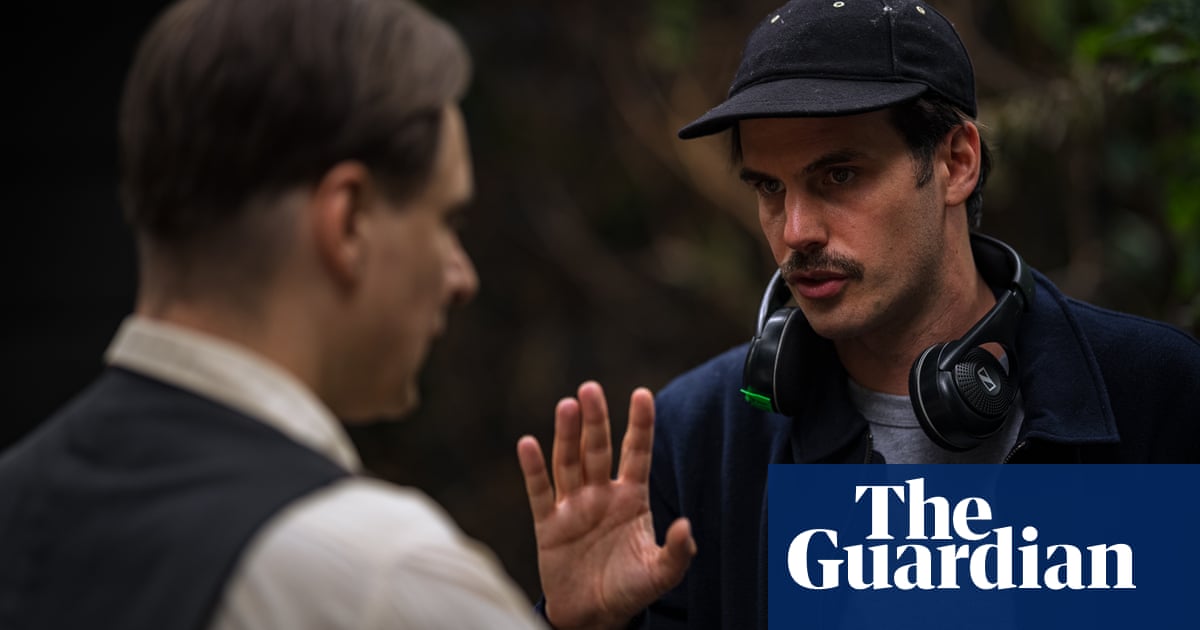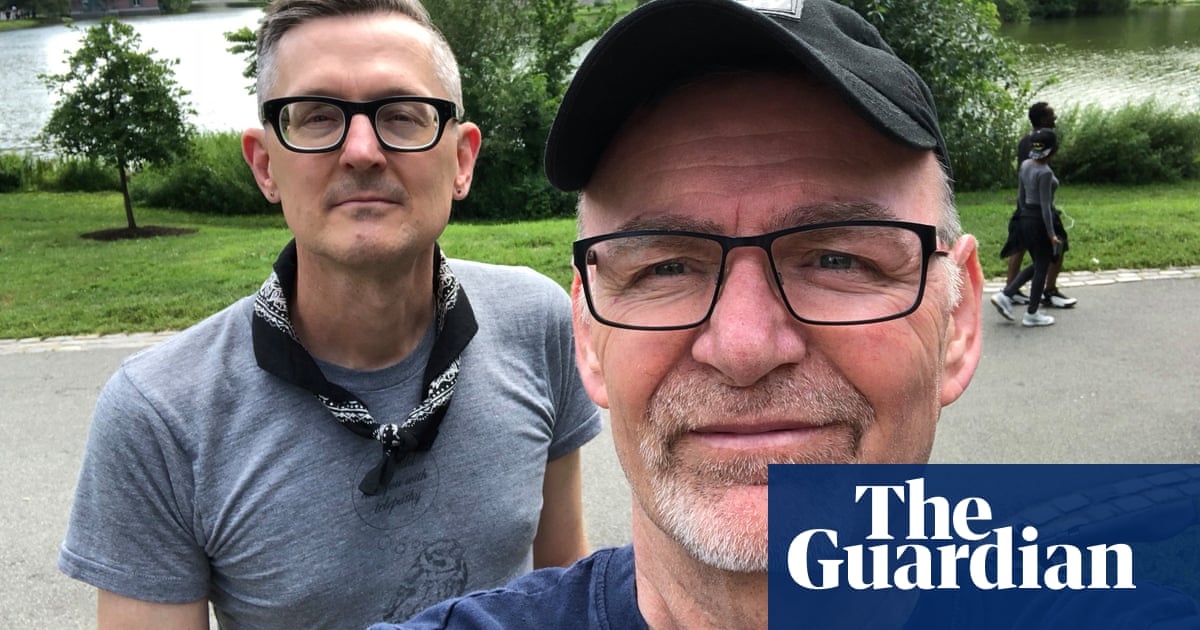
he spent only the first 12 years of her life in Sweden, but the country of her birth looms large for Ulrika Jonsson. She returns to it again and again, to explain why it didn’t occur to her that, past the age of 40, her career as a TV presenter might decline: “Coming from Sweden, I’ve always grown up with images of older women around me.” In the media and on billboards, she saw women with “white hair, grey hair, wrinkles, natural faces without makeup”. But the starkest difference in the UK is the sexism, she says.
In Sweden, Jonsson, 53, is celebrated as a proud export, portrayed with a Swedish saying that translates into something along the lines of “a woman running her own race”. In this country, take your pick: good-time girl, unfaithful wife, improbable lover of the world’s most boring football manager and – most scandalously – mother of four children by four men. She has been, however unfairly given her successful career, largely defined by her personal life.
In many ways, looking back, Jonsson appears to be not just ahead of her time but a victim of it – but she also offers a stark reminder that we may not have moved on as much as we think. Decades before the #MeToo movement called for us to believe survivors of sexual assault, Jonsson wrote openly about being raped as a teenager and had to endure the intense speculation – and furious criticism – that followed. Why didn’t she go to the police? Did that mean – some whispered – it didn’t really happen? She returned to the event in a column for the Sun recently, pointing out that if she were young and found herself in a similar circumstance today, she is “doubtful I would go forward to the police”. She referred to the comments by Dame Vera Baird, the victims’ commissioner for England and Wales, who said in July: “We are witnessing the decriminalisation of rape.”
I pull up to her beautiful, though not palatial, house in Oxfordshire. Inside, it is pristine – despite the party girl image, she says she was always a homebody. She is “crazy houseproud,” she says and you can see it in the flower arrangements and tasteful knick-knacks. It comes, she thinks, from her childhood, growing up with her dad and becoming “a bit of a housewife. Sort of looking after my dad, and he was pretty useless at looking after me, but not in an unkind way. I also think it’s quite good for your mental health to be living in a reasonably ordered state.” Three of her four children were with her during the lockdown and Jonsson, though not her children, came down with coronavirus early on. “I had to learn during lockdown that kids make a mess and I have to stand by. And that was tough.” She smiles, and surveys the open-plan room, large windows looking out on to a small orchard and fields beyond. “I make an excellent wife.” Then, with a laugh, “I’ve had enough practice.”
Her passion is for cooking, which she shows regularly on her Instagram account, and I suspect she’s trying to work out how to turn that into a new career. “I’m definitely a feeder,” she says. She is dressed all in black, grey apron on top, worn a bit like armour. We sit on feminine sofas (pink, curlicued) and two of her three bulldogs snore soothingly nearby.
The dogs, adopted from the Edward Foundation, which rescues and rehomes bulldogs, have rescued her back on several occasions, she says – without them getting her out of the house for walks, “I would have found it very easy to retreat when my ‘episodes’ of depression have been particularly bad.” She is open about her mental health on her (funny, and sometimes painfully honest) Instagram account. In a post in June, she wrote that she had been “blindsided by a spell of the Black Dog and sadness”. Although she has had therapy and taken antidepressants in the past, these days she manages it largely herself. “Cooking and friendships seem to be the key,” she says. “And dogs.”
Few celebrities have been chewed over as much as Jonsson; perhaps because she refused to be contained in the various narrow boxes we create for female figures – although she seemed to take her at-times harsh treatment with largely good humour. When she became famous as a TV-am breakfast show “weather girl”, she was expected to be glamorous (regular sunbeds were a must) but also the “girl next door”. The tabloids loved it. Jonsson was bemused. “[They would say] ‘sexy blonde TV presenter’. I thought, how do they know I’m sexy? Only whoever I’m in the bedroom with knows. But you’re 21, you’re not about to say anything. But yes, they definitely wanted you to be a certain way.”
On her next job, presenting Gladiators – the 90s show that pitted “contenders”, against absurdly proportioned people in Lycra – she was required to wear tight tops and leggings. “I have never felt so uncomfortable in my life,” she says. “But you’re being paid to do a job and at what point do you …” She thinks for a second. “Well, I did put my foot down – because I wasn’t wearing that the next series.” She had to fight to stay on the show, she says, when she became pregnant with her first child (they insisted on her being shadowed by a midwife, as if she might break). “I felt as if I was still normal, and I wanted to work.” Things like that, she says, were “kind of shocking and disappointing”.
Jonsson’s appearance as a team captain on the cult show Shooting Stars still remains a high point for women on panel shows; she would either roll her eyes at Vic Reeves and Bob Mortimer’s silliness or join in enthusiastically.
Jonsson never took herself seriously. She had wanted to act, but her mother encouraged her to become a secretary. She became a PA to the TV-am boss Bruce Gyngell, before she was put on television.
Her rise coincided with intense tabloid interest. She left her first husband, a TV-am cameraman and the father of her first child, when it became clear to her she was becoming attracted to one of the Gladiators, a He-Man-lookalike known as Hunter (she had already had a previous affair that had made the papers). It was an irresistible story: “I guess if you’re a woman, it’s twice as bad if you’re not conforming,” she says. “I tend to live my life for me. Because I was unfaithful in my first marriage, that doesn’t reflect particularly well, whereas I’m pretty sure if I’d been a man, it would have been passed over. But it was shocking to them because it was like, ‘Hang on, girl next door, what have you just done?’ That doesn’t fit.”
For the next few years, Jonsson was portrayed as skipping the rails if not going off them (the “ultimate ladette” according to one paper). She had had strict teen years, then been married for most of her 20s. “There hadn’t been an outlet for all the craziness and fun things,” she says. “So that happened in my 30s. And that was the height of my career, so it was the perfect storm.” She wasn’t naive – there were photoshoots for lads’ magazines, and sexy campaigns for unsexy underwear companies. But the attention was also “pretty intense. I didn’t cope with it very well. I found it very scary and it created enormous levels of anxiety, real physical shaking, heart racing.” She would be followed by photographers, and later found out her phone had been hacked.
Over the next few years it got worse. Her high-profile relationship with the footballer Stan Collymore came to a brutal end when he attacked her in a bar in Paris in 1998. Then she met a German hotel manager on holiday, but he left her the day she took their baby daughter home from hospital, following heart surgery (all chronicled by the tabloids). She had another daughter with her next husband, Lance Gerrard-Wright, the subject of a reality show, Mr Right, in which he was the “prize” (Jonsson, hosting, bagged him instead). And her 2002 autobiography detailed her surprising affair with the then-England football manager and fellow Swede, Sven-Göran Eriksson, as well as dates with Prince Edward. Her third marriage, to an American advertising executive, broke up last year; he lives nearby and they co-parent their 12-year-old son.
Three marriages over three decades isn’t that bad, she points out, but her turbulent love life has often been linked to her turbulent childhood. Her mother left when Jonsson was eight, moving to the UK (Jonsson would join her four years later). Her father, a driving instructor, whom Jonsson adored, was fun and charismatic but not exactly responsible – she would be largely left alone to look after herself, and he carelessly exposed her to his sex life in a way we would consider abusive these days (he had a lot of young girlfriends, often at the same time, and made little attempt to hide their activities).
Did the coverage she attracted feel unfair? “From a female point of view, definitely. I keep going back to being Swedish but Sweden feels to me one of the most egalitarian countries, and the idea of there being assumptions made about you because of your sex …” It wasn’t something she had grown up with, she says. Whereas in the UK, it felt “like a massive wave and there’s no way you could fight that”. But she says she refused to live her life in fear of what it would look like. She smiles, blue eyes glittering. “Even though sometimes I had an exasperated agent going” – she puts her head in her hands – “‘Nooo.’”
How does she feel about the way she is judged for having four children by four men (a “4x4 mum”)? “I mean, it is quite funny,” she says and laughs, “on the face of it. But we never talk about Rod Stewart [who has children with five women].” Or Boris Johnson, I point out. “He just hasn’t counted his. All my children live with me. We judge women so much more harshly than men.”
In the aftermath of the attack by Collymore, there was a feeling in some quarters that she had brought it on herself – that she had been drinking and provocative. “I was beyond staggered. I was definitely drunk – I was in a really happy, drunk place – but it had absolutely nothing to do with me. I heard from people like, ‘You were taking your top off.’ Very obviously I didn’t, but even if I had … This is the whole thing about responsibility, culpability or whatever, you hear it all the time in other situations: ‘She does wind him up.’ What?”
But the biggest storm came when, in her 2002 memoir, Jonsson wrote about being raped in a hotel room when she was 19. Although there was sympathy, there was also the uncomfortable sense that Jonsson’s account was being questioned. “People were like, ‘Why didn’t you go to the police?’,” she says. “Because there was no such thing as ‘date rape’ in those days. I feel like women are kind of born culpable. It’s always somehow our fault.” Even though she sought hospital treatment for her injuries, she says it never occurred to her to report it. “It happened in a hotel room,” she says simply, of the days when people believed rape was committed by strangers in dark alleys.
She worries, rightly, that many still do. In her recent Sun column, she referred to the report by Vera Baird that showed the number of prosecutions for rape in England and Wales in 2019-20, according to figures released by the Crown Prosecution Service (CPS), was at its lowest level since records began, and 30% lower than the previous year. Baird blames a change in CPS policy (denied by the CPS) that means that “weaker” cases are being weeded out to improve the low conviction rate.
“It’s like taking a backwards step,” says Jonsson. “How difficult the CPS are making it for the police to put forward cases, that unless there’s a very good prospect of conviction, then forget about it. Which means that clearly there are incidences where sexual assaults and rapes are taking place and people are getting away with it because it’s no longer a crime.” She is horrified at the prospect that (predominantly) women are not getting justice because of targets. “It’s all about figures. You thought we were becoming more human.”
The landscape for reporting historic sex crimes has changed since Jonsson’s rape – would she ever report it now? “No,” she says quietly. “I don’t think it would …” She doesn’t finish the sentence. There are people around her to think about, she says.
In the last few years, Jonsson stepped back from TV partly to spend more time with her children, but also because of what she was being offered. “They don’t need TV presenters now, they just need someone from a reality show. I’m also older.” She says she “categorically” doesn’t miss being as famous as she was. But she still knows how to get into the papers – there are post-shower selfies for instance (although admirably authentic shots), and she must have known when she revealed last year that she and her former husband had virtually had a sexless marriage, the tabloids would love it. “I feel like those are really important things to talk about,” she says. “Coming into this age now, menopause, I don’t want life to slow down in that way.” She laughs. “I mean, I have to slow down because of my hips. But a lot more women in their 50s are taking greater freedoms and having more independence. I rail against this whole thing that we should go quietly, become invisible and just disappear.” With Jonsson, that never seemed likely.












